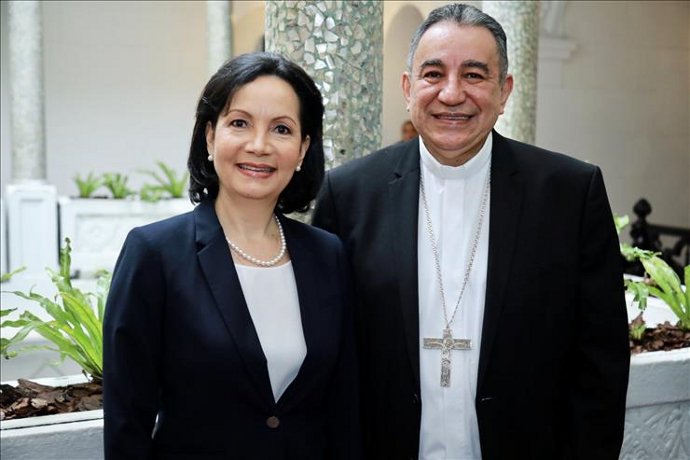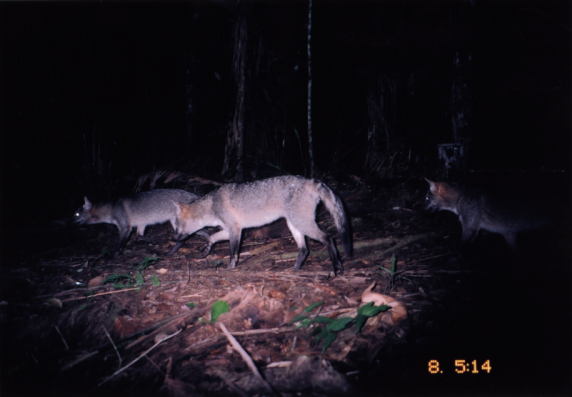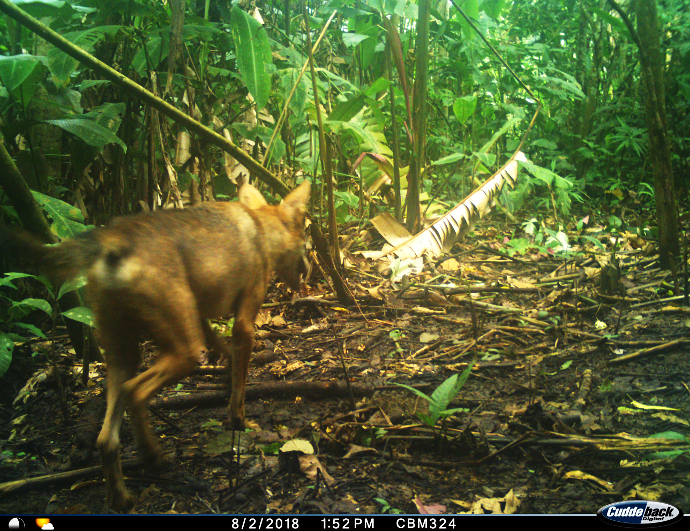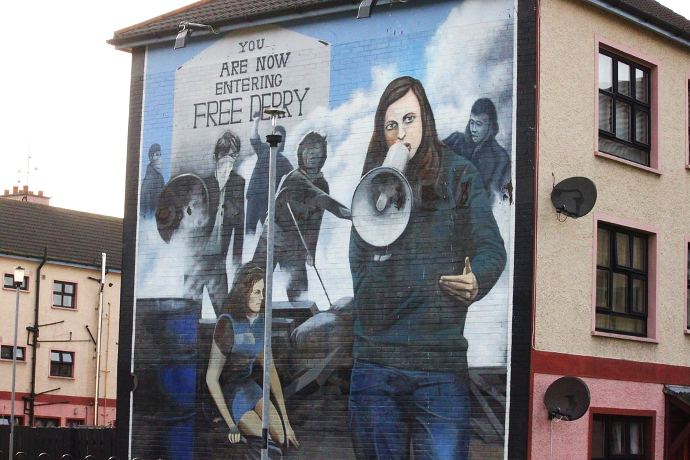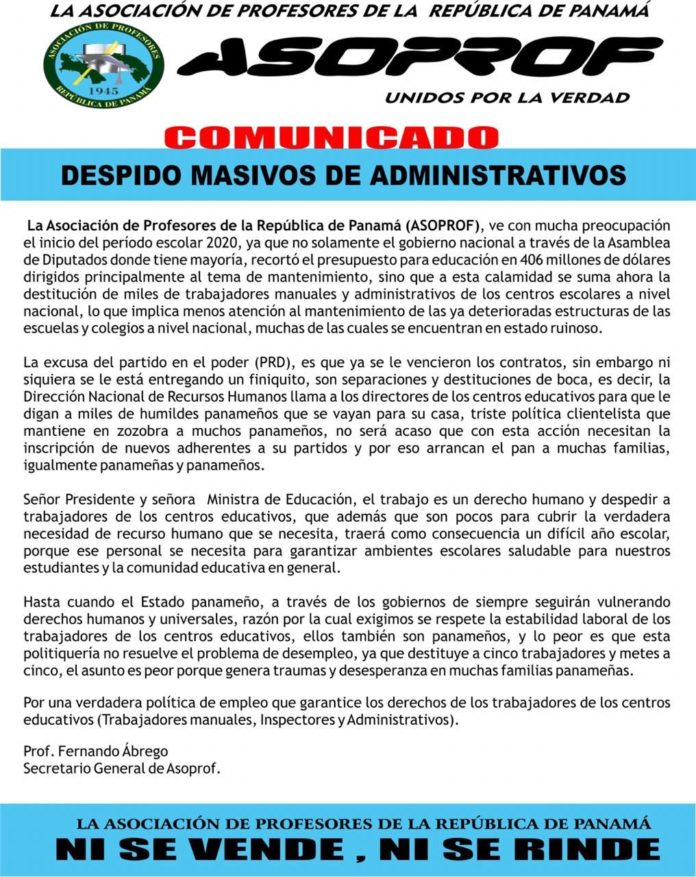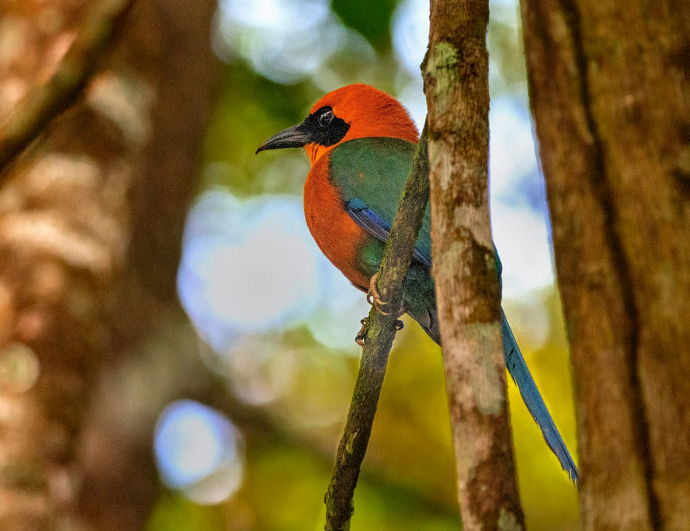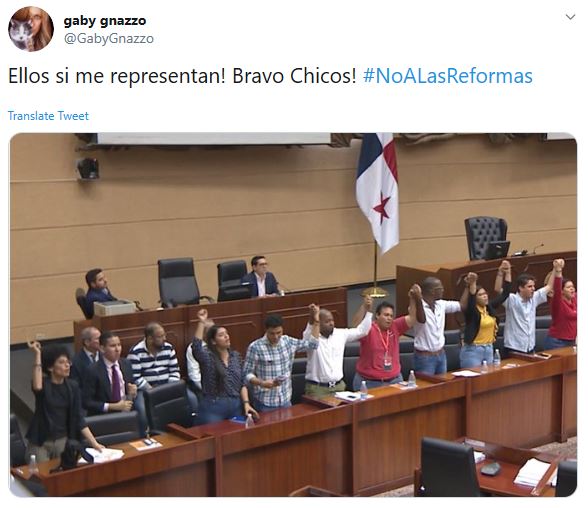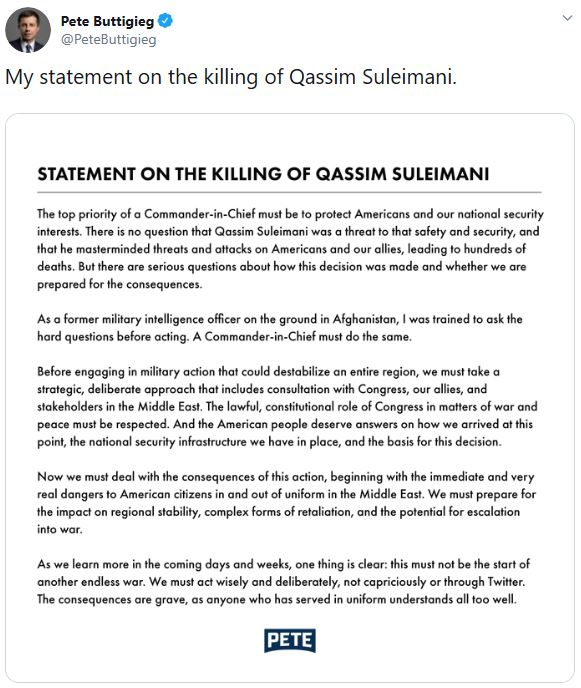Magistrate Maribel Cornejo’s first day on the job, with encouragement from Archbishop Ulloa. Supreme Court photo.
Pivot time for Panamanian justice, or… ?
by Eric Jackson
Two main events, perhaps watersheds, are beginning to make themselves felt down the lines of Panamanian criminal justice.
Two of the three magistrates of the Supreme Court’s penal bench were appointed by the president and ratified by the legislature in December. Along with a third magistrate on the administrative bench and a number of new suplentes (alternate magistrates), they are settling into their new offices at the high court on Ancon Hill. At the first of the year the former attorney general, Kenia Porcell, left that post under a cloud of scandal with presidential appointee Eduardo Ulloa stepping in to serve the remainder of her term.
The new lineup faces some old cases on appeal, and some cases against those who have just been replaced. Some of these include:
Ricky Martinelli’s voyeurism
A trial court ruling throwing out the eavesdropping and theft case because of a specious finding that evidence sent below by the Supreme Court is inadmissible is, by previously ordinary procedures, not subject to reversal on appeal. Nevertheless it is to be heard on motions by several parties by a three-woman criminal bench panel of new magistrates María Eugenia López Arias and Maribel Cornejo, plus Asunción Alonso, the suplente for recused magistrate José Ayú Prado. Procedurally, there are several motions in this matter, including a straight-up appeal of last August’s not guilty verdict, motions to annul the verdict and consider the evidence on all court records in the case de novo filed by the anti-corruption prosecutor and one of the private complainants, and concurring motions using different arguments by several other private complainants.
These matters were before the bench before López and Cornejo took office. The drafting of an opinion was in the hands of now former suplente Wilfredo Sáenz, who was the alternate for now former magistrate Harry Díaz. Sáenz did write an opinion in the case, which was not heard during the holidays by the mostly lame duck panel then assembled. This draft has been handed over to Cornejo, who is the ponente (rapporteur) and who might scrap or alter it, or pass it on unchanged to the rest of the panel for consideration.
Panamanian law, based on the Civil Code which goes back through the Napoleonic Code to Roman Law, unlike the Anglo-American Common Law, places little authority on precedent. But here there were very unusual rulings on procedure and evidence validating practices that allow the courts to be overpowered and timed out, and which would allow lower courts to defy Supreme Court orders with respect to cases that they remand. This appeal and motion to quash the verdict, based on procedure in the first instance as it may be, could have rare weight as precedent. Especially so, as the Code of Criminal Procedure is relatively new and it can be said that the panel faces a case of first impression.
So what if the three women suppress the lower court’s ruling, review the sum of all evidence in all proceedings about Martinelli, and accept the trial prosecutor’s demand before the lower court?
The case is first about him directly intercepting the communications and in some cases turning computers or cell phones into room bugs aimed at 150 specific people but affecting thousands with whom those targets of the ex-president’s wrath or curiosity communicated. (Expand the room bug part of it along the lines of testimony that the most salacious recordings were specially delivered to Martinelli and it might be a Internet pornography case, but that has not been specifically charged.) The other things that have been specifically charged is that Martinelli stole the mostly Israeli equipment and programs to run the Pegasus eavesdropping system, which have never been recovered and may still be in use.
Down below, the trial court asked for a 22-year prison sentence. If the ladies of the penal bench approve and impose such a sentence, it can be anticipated that Ricky Martinelli will start up with his health complaints again and perhaps the magistrates will anticipate that with orders about it. If things go very badly for Ricardo Martinelli Berrocal, he could go to a hellish mainline penitentiary for the rest of his life, and if in need of hospitalization do that time in the prison ward at Santo Tomas Hospital rather than in some luxury private hospital suite.
The VarelaLeaks complications
Are these related to Martinelli’s spy equipment issue as discussed above? It’s one of Panama’s great mysteries.
SOMEBODY hacked into former president Juan Carlos Varela’s WhatsApp communications on his cell phone. Most alarmingly for a lot of people, there were discussions between now former attorney general Kenia Porcell and Varela about cases before – or kept out of – the justice system.
There has been grumbling about selective publication of some of the intercepted communications, but none of the principals have outright denied the authenticity of the VarelaLeaks. But still, the provenance of the documents is an issue that will trouble prosecutors and courts to the extent that they are called upon to act on them. (In Common Law jurisdictions this stuff is generally hearsay and inadmissible. In Civil Code jurisdictions there is a lesser barrier to hearsay, which, however, is treated as far less definitive proof. And unlike the US system, there is no “fruit of the poisoned tree” doctrine to exclude the products of investigations based on illegally obtained evidence in Panamanian law.)
Under the Panamanian system the Administrative Prosecutor (Procurador de la Administración) investigates criminal complaints against the Attorney General (Procurador or Procuradora de la República). More than a dozen complaints were filed with the administrative prosecutor, Rigoberto González. Two of these were being actively looked into by González. One, by law professor, radio show host and activist Miguel Antonio Bernal, his cousin and former Seguro Social chief Rolando Villalaz, Donaldo Sousa and others, all lawyers, antedates the VarelaLeaks and accuses Porcell of abuse of authority and may be bolstered by new evidence from the VarelaLeaks. The other, by attorney Enrique González Tejeira, directly flows from the purloined text messages and accuses Porcell of a variety of crimes revolving around the general principle that she attacked the integrity of government institutions by way of her back channel dealings with the former president and actions taken or avoided in light of these.
So González met with the new attorney general, Eduardo Ulloa, to deliver these two case and at least 15 other complaints now that it would not be a matter of Porcell investigating herself. If these proceed from prosecutors’ office to the courts, they may ultimately come before the first ever female dominated penal bench and the high court politics that we have seen over the previous decade or so might be very different. Or might not be.
The Odebrecht case resumes
The First Superior Tribunal has reversed a series of rulings by trial court Judge Oscar Carrasquilla that threw out the criminal investigations into the Odebrecht cases on the grounds that prosecutors had run out of time. However, it was based on what the appeals court said was the judge’s miscalculation of time, which cut off five months from what prosecutors figured that they had left. So the anti-corruption prosecutor gets those five months back.
Surely one or more of the 122 individuals or 416 corporations named will appeal to the Supreme Court, whose penal bench, we have noted above, is under new management.
Added complications come from the VarelaLeaks, which appear to show the former president and the former attorney general conniving to block inquiries into Varela administration figures’ dealings with the hoodlum Brazilian construction conglomerate. Plus, here and in other countries new testimony and new witnesses affecting the case have come to light. Do they hive off the Odebrecht case into another matter with another timeline to deal with new evidence, or consolidate all matters and give prosecutors yet more time for an even more complicated investigation. Or are prosecutors nearly ready to bring at least part of it to trial?
Here again, defendants’ tag team delaying tactics and incongruous lower court decisions have taken a high profile. This case, added to abuses in many other public corruption matters, may lead a changed high court to issue some new administrative rules about such things. Or maybe not.
Judge Loaiza to the rescue again – but it’s being appealed
A little after three in the morning on December 17 12th Penal Court Judge Leslie Loaiza cut loose five high-profile defendants from a case involving the looting of the National Assistance Program (PAN) during the Martinelli administration. This was a fund set up with part of the revenues from Panama Canal tolls, and was used for all sorts of overpriced contracts with kickbacks which were apparently mostly destined for the 2014 Cambio Democratico campaign.
Not enough evidence, Judge Loaiza said, acquitting former PAN director Giacomo Tamburrelli, former Public Works Minister Federico José Suárez, former Education Ministery Lucy Molinar, PAN’s nutrition director Ángel Antonio Famigletti and businessman Rubén Antonio De Ycaza Arias. It was about a $44.9 million contract for the purchase of imported dried foods for the public schools’ lunch programs.
Loaiza has let a lot of public corruption defendants off the hook and is the object of much public suspicion. But he says he’s just enforcing the law based on the evidence presented. The Martinelistas hail his rulings as proof that there never was any corruption in the Martinelli administration but even a lot of Cambio Democratico voters won’t buy that. (They’ll say that it was a corrupt administration, but one that got good things done.)
In any case, the prosecution has appealed and the case may yet be revived. Other controversial Loaiza rulings also have pending appeals.
This one judge got some 40 percent of the public corruption cases coming before the 18 judges of Panama City’s penal courts, which may raise some more administrative issues for the new lineup at the Supreme Court. Were defense lawyers judge shopping? Was there someone on the inside tipping the balances on case assignments? Do new rules need to be issued to the lower courts, of which the high court has superintending control?
Contact us by email at fund4thepanamanews@gmail.com
These links are interactive — click on the boxes

